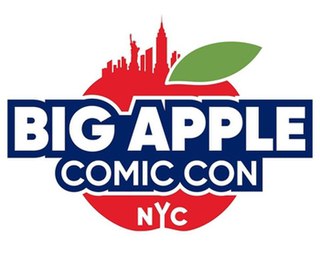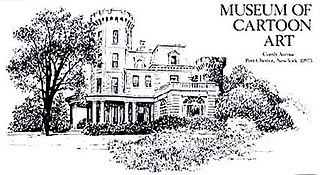Notable events of 1996 in comics.
Notable events of 1997 in comics.

The Cartoon Art Museum (CAM) is a California art museum that specializes in the art of comics and cartoons. It is the only museum in the Western United States dedicated to the preservation and exhibition of all forms of cartoon art. The permanent collection features some 7,000 pieces as of 2015, including original animation cels, comic book pages and sculptures.
Notable events of 2004 in comics.
Notable events of 2005 in comics.
The Small Press Expo (SPX) is an American alternative comics convention. A registered 501(c)(3) that was created in 1994, every year since its inception, SPX has put on a festival, known as The Expo, that provides a forum for artists, writers and publishers of comic art in its various forms to present their creations to the public and to expose the public to comic art not normally accessible through normal commercial channels. The annual SPX festival is typically held in the fall in Bethesda, Maryland. SPX is unique amongst the various comic conventions as it does not allow retailers to have a formal presence at the convention. Only creators and publishers are allowed to set up at the festival, although retailers can and do attend the show with the general public through paid admissions.
Notable events of 1999 in comics.
Notable events of 1998 in comics.

The Big Apple Comic Con is a New York City comic book convention, the longest-running comic book/speculative fiction/pop culture convention in New York City. It was started by retailer Michael "Mike Carbo" Carbonaro in March 1996 in the basement of the St. Paul the Apostle Church. During its heyday from 2001 to 2008, the Big Apple Comic Con often featured multiple shows per year, with a large three-day "national" convention held in November, usually held at the Penn Plaza Pavilion. The show was owned by Wizard Entertainment from 2009 to 2013, but was reacquired by Carbonaro in 2014.
Notable events of 1995 in comics.
Notable events of 2003 in comics.
Notable events of 2002 in comics.

The National Cartoon Museum was an American museum dedicated to the collection, preservation and exhibition of cartoons, comic strips and animation. It was the brainchild of Mort Walker, creator of Beetle Bailey. The museum opened in 1974, and went through several name changes, relocations, and temporary closures, before finally closing for good in 2002.

The Billy Ireland Cartoon Library & Museum is a research library of American cartoons and comic art affiliated with the Ohio State University library system in Columbus, Ohio. Formerly known as the Cartoon Research Library and the Cartoon Library & Museum, it holds the world's largest and most comprehensive academic research facility documenting and displaying original and printed comic strips, editorial cartoons, and cartoon art. The museum is named after the Ohio cartoonist Billy Ireland.
Comics studies is an academic field that focuses on comics and sequential art. Although comics and graphic novels have been generally dismissed as less relevant pop culture texts, scholars in fields such as semiotics, aesthetics, sociology, composition studies and cultural studies are now re-considering comics and graphic novels as complex texts deserving of serious scholarly study.
Notable events of 2013 in comics. It includes any relevant comics-related events, deaths of notable comics-related people, conventions and first issues by title. For an overview of the year in Japanese comics, see 2013 in manga.
The Festival of Cartoon Art was a triennial conference on the art of comics held at Ohio State University from 1983 to 2013. The conference was produced by what is now known as the Billy Ireland Cartoon Library & Museum.

A comic book convention or comic con is a fan convention with a primary focus on comic books and comic book culture, in which comic book fans gather to meet creators, experts, and each other. Commonly, comic conventions are multi-day events hosted at convention centers, hotels, or college campuses. They feature a wide variety of activities and panels, with a larger number of attendees participating in cosplay than most other types of fan conventions. Comic book conventions are also used as a vehicle for industry, in which publishers, distributors, and retailers represent their comic-related releases. Comic book conventions may be considered derivatives of science-fiction conventions, which began in the late 1930s.
Amadora BD is an annual comic book festival held in Amadora, Portugal. Founded in 1989, it is considered the most important cartoon festival in Portugal and one of the most important European competitions.




